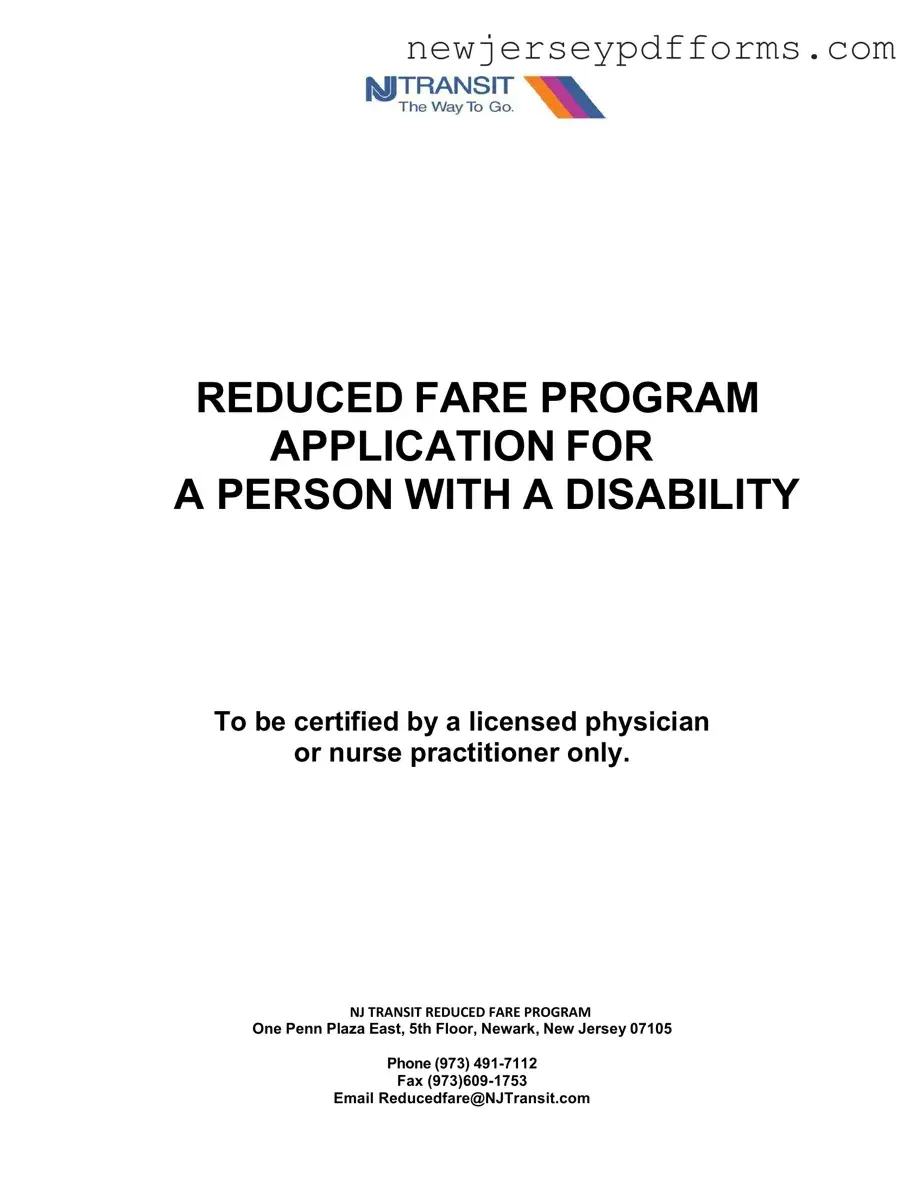The NJ Transit Discounts for Disabled form shares similarities with the Social Security Disability Insurance (SSDI) application. Both documents require a detailed assessment of an individual's medical condition to determine eligibility for benefits. Just like the NJ Transit form, the SSDI application mandates that a licensed medical professional provide supporting documentation. This ensures that only those with legitimate disabilities receive assistance, thus protecting the integrity of the program.
Another comparable document is the Supplemental Nutrition Assistance Program (SNAP) application. SNAP, like the NJ Transit form, has specific eligibility criteria based on an individual’s financial and health status. Applicants must provide proof of their situation, which often includes medical documentation, to qualify for benefits. Both forms aim to support vulnerable populations, ensuring they have access to essential services.
The Medicare application is also similar in its requirement for medical verification. Individuals applying for Medicare due to disability must provide documentation from healthcare providers confirming their eligibility. This process mirrors the NJ Transit form, where a licensed physician certifies the applicant's disability. Both applications are designed to ensure that those in need receive the appropriate benefits.
Similarly, the Medicaid application requires documentation of a disability for those seeking coverage. Just as with the NJ Transit Discounts for Disabled form, applicants must submit detailed medical information from a qualified healthcare provider. This helps to establish the applicant's eligibility and ensures that resources are allocated to those who truly need them.
The Veterans Affairs Disability Compensation application also shares this commonality. Veterans seeking compensation for service-related disabilities must provide medical evidence to support their claims. This process is akin to the NJ Transit form, where a physician's certification is necessary to validate the applicant’s disability status. Both aim to provide support to individuals who have faced significant challenges due to their conditions.
The Americans with Disabilities Act (ADA) certification process is another document with similar requirements. Individuals seeking accommodations under the ADA often need to provide medical documentation to confirm their disability. This is comparable to the NJ Transit Discounts for Disabled form, where physician certification is crucial for validating eligibility. Both processes emphasize the importance of medical verification in accessing necessary support.
If you're looking to secure your estate planning, consider our comprehensive guide on the Last Will and Testament form found at California Last Will and Testament form requirements. This form is crucial for formally expressing your wishes and ensuring they are carried out effectively.
The Ticket to Work program application also parallels the NJ Transit Discounts for Disabled form. Individuals with disabilities seeking to return to work must provide medical documentation to demonstrate their eligibility for services. Like the NJ Transit application, this process ensures that individuals receive appropriate support tailored to their specific needs.
The Low-Income Home Energy Assistance Program (LIHEAP) application shares similarities in its requirement for documentation regarding an applicant's financial and health status. Just as the NJ Transit form requires medical verification, LIHEAP applicants must provide proof of their situation to qualify for assistance. Both programs aim to alleviate the burdens faced by individuals with disabilities or low income.
The Independent Living Program application is another document that resembles the NJ Transit Discounts for Disabled form. This program supports individuals with disabilities in living independently, and applicants must provide medical documentation to establish their eligibility. Both forms emphasize the importance of verifying an applicant’s disability to ensure that resources are allocated appropriately.
Finally, the Child Disability Benefits application mirrors the NJ Transit Discounts for Disabled form in that it requires medical documentation to support claims. Parents seeking benefits for their children with disabilities must provide evidence from healthcare providers. This process is similar to the NJ Transit application, where a physician’s certification is vital for determining eligibility, ensuring that support is provided to those in need.

